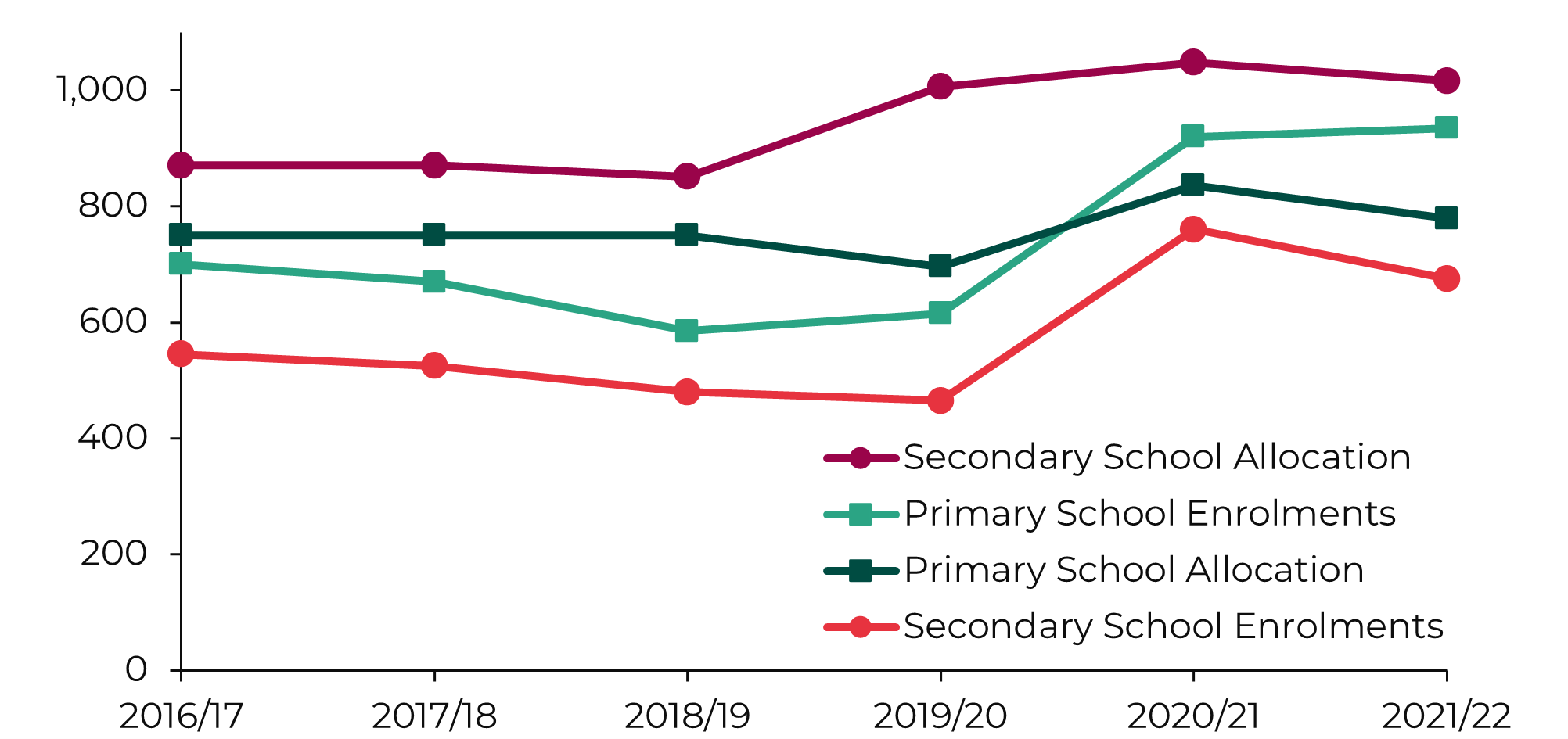For many years, the number of people training to be teachers did not meet Welsh Government targets. Some have suggested that there is a recruitment and retention crisis. Our article explores these issues.
Recruitment to teaching
To be a teacher in maintained schools in Wales, a person must hold Qualified Teacher Status (QTS) and complete a period of induction. QTS is gained through undertaking a programme of Initial Teacher Education (ITE).
The Welsh Government sets a national intake figure for recruiting students onto primary and secondary ITE programmes in Wales. This takes account of the estimated demand for new teachers. Based on this national number, the Education Workforce Council (EWC) allocates intake targets to each ITE Partnership – there are currently seven in Wales. There are separate allocations for primary and secondary teaching, undergraduate and PGCE (post-graduate) routes and for secondary teaching there are specific allocations for individual subject specialism.
In 2020/21, for the first time in six years, the number of new primary school trainees was above the total allocation. The allocation was exceeded again in 2021/22. However, in 2021/22, the number of new secondary school trainee teachers was well below the allocation, as has been the case for every year since 2016/17.

Source: Welsh Government: Initial teacher education: September 2021 to August 2022
The National Foundation for Educational Research (NFER) suggested the increase in the number of applicants to ITE courses in Wales was due to uncertainty in the wider labour market. Teaching had continued throughout the pandemic, while other industries reduced recruitment. It also suggested that fewer teachers left in 2020, given the uncertainty caused by the pandemic. Their analysis found that:
…while the Welsh school system was facing a growing challenge of ensuring there are sufficient numbers of teachers before the pandemic, this has been eased somewhat in the short term.
Shortage areas
The NFER did note that there continued to be evidence of recruitment and retention challenges in some areas, including teachers of ‘shortage subjects’ (such as Welsh, maths, science and modern foreign languages), and in Welsh-medium schools and schools in areas with high levels of disadvantage.
The Welsh Government has a number of recruitment priorities for teaching. These include attracting those from diverse backgrounds including Black, Asian and Minority ethnic students; those with specific subject specialisms for secondary school teaching; and secondary school trainee teachers training to teach through the medium of Welsh. There are teacher training incentive grants available for trainees in these areas.
The Welsh Government expects that ITE partnerships work towards an intake of 30% of students preparing to teach through the medium of Welsh. Further information on the Welsh-medium workforce can be seen in our article from May 2022 and the Welsh Government’s ten-year workforce plan.
The Welsh Government also expects ITE partnerships to work towards an intake of 5% of students from a Black, Asian and Minority Ethnic background. Welsh Government commissioned research showed there is an under-representation of Black, Asian and Minority Ethnic teachers in the workforce. The Welsh Government’s Initial teacher education Black, Asian and Minority Ethnic recruitment plan included training incentives and specific intake allocations.
Retaining teachers
Teaching unions have expressed concern about recruitment and retention, with one characterising it as a ‘crisis’. Initial findings of the responses to the NASUWTs 2023 Big Question survey found that nearly three-quarters of teachers in Wales had seriously considered leaving the teaching profession over the previous 12 months.
The 2021 workforce survey by the EWC found that 16% of school teachers intended leaving the profession within the next three years. The NFER’s workforce report found that less experienced teachers have higher leaving rates than their more experienced counterparts. They also said that there are persistent disparities in leaving rates between schools in disadvantaged areas and schools in more affluent areas .
Teacher workload
Teachers’ workload is a continuing concern, and impacts on teacher retention. The EWC’s 2021 National Workforce Survey found that school teachers worked on average 56 hours a week with 70% of school teachers strongly disagreeing that they were able to manage their workload.
Tackling staff workload and reducing bureaucracy was a key action in the Welsh Government’s 2017 education action plan, Our National Mission and is a commitment in the current strategy Our national mission: high standards and aspirations for all (March 2023). Ongoing work to reduce workload and bureaucracy was also part of the 2022/23 pay deal with teaching unions. In July 2023, the Minister for Education and Welsh Language outlined that workload issues will be “at the forefront” of Welsh Government policy development, and that school reporting requirements are being reviewed.
A further statement was issued on 9 November 2023. This provided updates on a range of measures including the workload impact assessment which will be published at the end of November.
Professional Learning
The EWC also identified that professional learning was an important factor in aiding the retention of teachers. The National Approach to professional learning was launched in 2018. This aimed to support the significant education reforms in Wales and address the variation in access and entitlement, quality and impact of professional learning across the country.
A National Professional Learning Entitlement is available for all teachers and teaching assistants, leaders, and system leaders or advisors who support schools or settings. The Entitlement builds on and takes forward key strands of the National Approach. It aims to set out how the continued development of practitioners will support schools and their learners to realise the four purposes of the Curriculum for Wales, supporting learners with additional learning needs and embedding equity, well-being and the Welsh language across the whole-school community.
On 14 September 2023, the Minister announced the establishment of a new National Endorsement Panel who will be responsible for setting endorsement criteria and quality assuring professional learning submitted for endorsement. The Panel will be made up of a range of stakeholders such as the EWC as well as school leaders and practitioners.
Supply teaching
We wrote in December 2022 about the employment of supply teachers in Wales. In December 2022, the Minister for Education announced that a new technology booking platform would be available from September 2023. The National Supply Pool for Wales aims to provide supply teachers with direct supply work opportunities from schools and potential eligibility for the Teachers' Pension Scheme. Its implementation is being staggered across local authorities in Wales.
The Minister also announced that alongside the booking platform, the independent Welsh pay review body which makes recommendations to Welsh Ministers on teachers' pay and conditions, has been asked to consider whether different pay, terms and conditions could apply to the various roles and responsibilities of teachers and supply teachers within the system.
“The quality of an education system cannot exceed the quality of its teachers”
Successive Education Ministers have emphasised the adage that an education system is only as good as its teachers. Getting the structures and foundations right for the education workforce is therefore likely to be crucial to realising the Welsh Government’s national mission of “high standards and aspirations for all”.
Article by Sian Hughes, Senedd Research, Welsh Parliament






